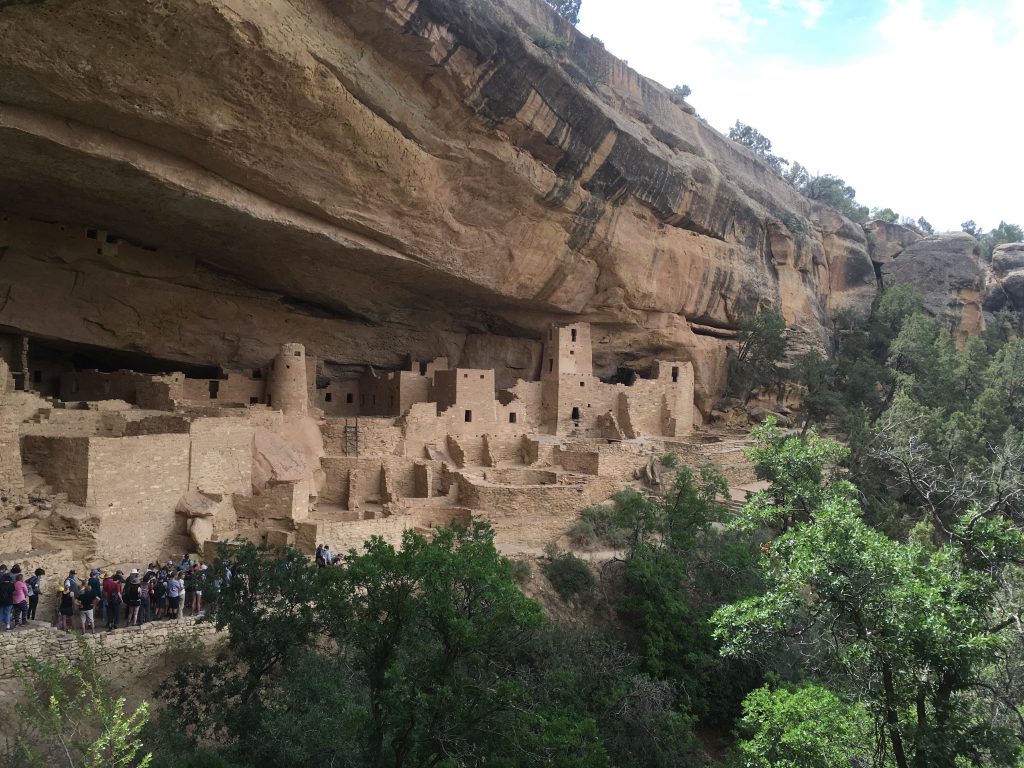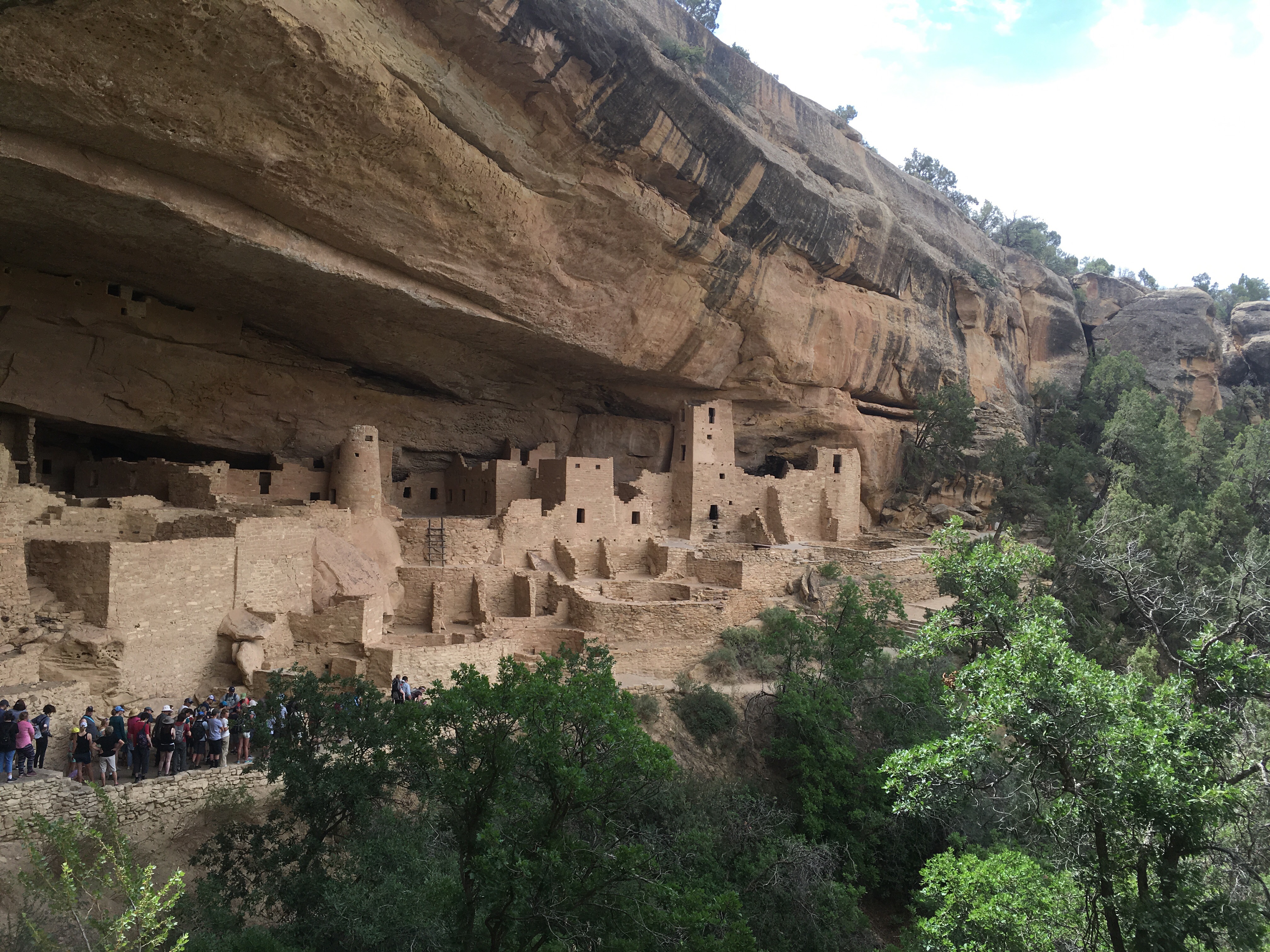
Noah Baerman, “Cliff Palace”
written by Noah Baerman
Sometimes I’m asked where I find inspiration for music, and the answer varies pretty widely. When I’m most lucky, the feeling that compels me to compose something is so clear in its initial burst that the subsequent process, however long and laborious it may be, is imbued with that clarity, a quest to find the notes that bring me to that same space. So it has gone with the creation of my new suite, Cliff Palace, a process that took either 15 months or an hour depending on how you look at it. So much of what moves me about the human condition hit me all at once on June 14, 2018, and if audiences can feel even a fraction of that, I will have done my job.
For our 20th (!) wedding anniversary last year, Kate and I zoned in on a couple places in New Mexico I had long wanted to see and a couple national parks in Utah that had long piqued her interest. As a comparatively casual item on our itinerary, we decided to spend a couple days at Mesa Verde National Park in Colorado en route from NM to UT, and while there we took the unusual step of buying a ticket for a guided tour, as that was the only way to get up close to view Cliff Palace, a system of dwellings carved into the landscape by the Pueblo people and inhabited for only a few decades in the 1200s. What I knew going in was . . . well, that, and that it looked kind of cool.
As we descended into the dwellings, I felt a kinetic energy beyond what I’m accustomed to getting from either nature or architecture. Our guide was a ranger named Michael Pieper, who went well beyond a simple regurgitating of historical and geological tidbits. Through what we saw and through his narrative, a vivid picture was painted of adversity, ingenuity, community, overcoming, and more adversity. He explained the various peoples who worked together to make life work under these challenging conditions, the sharing of ideas and duties that made it possible, and the conditions (particularly drought) that ultimately made this harmony unsustainable. He managed to communicate a deep reverence for the Pueblo people and an appropriate level of indignation over those in more recent times who have exploited them and who have made choices that have led to environmental damage even worse than that which made Cliff Palace only temporarily habitable.
I think this narrative amidst such a stunning environment would have hit me regardless of timing, but the timing in this case was particularly intense. I had already committed to compiling and recording (in what has become the Love Right project) the music I had been making in the wake of my friend, collaborator, and student Claire Randall’s murder a year and a half prior. There were songs of grief, songs of philosophical reflection, and songs of hope or at least fragments of solace on the path forward. I did not know what form it would take or how I would bridge the gap from anguish to reflectiveness. This experience and the unresolved tensions between inspiration and despair flooded into that part of my consciousness that had been occupied with a question mark. There was at once a complete lack of clarity (indeed, the emotions evoked were those of irreconcilable contradictions) and a focused intuitive awareness that the way that this didn’t make any sense made complete sense.
Within a couple days, those emotions were manifesting in sounds in my head, as I tried to find the balance between complete presence on a breathtaking hike in Arches National Park and making sure to catalogue these sounds. Some of it took the form of melodic themes, some of it rhythms. Right away I heard the “classic” instrumentation in my head of an acoustic jazz sextet with three horns, piano, bass, and drums. This is on one level pretty mundane given the ubiquity of that sound in modern jazz (not unlike saying that in a burst of inspiration I realized that for dinner that night I needed to order a pizza), but I realized subsequently that because I have spent most of my career gravitating towards groups that were larger, smaller, or of more unusual instrumentation, I hadn’t written extensively for a 3-horn frontline since I was 20, which was a hot minute ago.
By dumb luck, that summer it was time to apply for the inaugural Artists’ Award in Music for the Guilford Performing Arts Festival (a burgeoning festival in my region). Applying for this award was the next step in bringing Cliff Palace to fruition for both obvious and subtle reasons. Obvious in that I won the award, and that provided a mandate to actually compose this music in time to perform it at the festival (which as of this writing is a few days away, 9/27/19) and the economic fuel to be able to record it and get some exceptional musicians to play it. Subtle in that simply completing the application made me dig into the musical and extramusical inspiration deeply enough that by the time I sent it, I couldn’t imagine not writing it anyway.
And so began the gruntwork part of the process. Having granted myself the treat of writing for this musical configuration, I found myself drawing particular inspiration from four jazz sextets that served as particularly formative influences for me. These were, in chronological order of their recorded output, Booker Little’s two sextet albums, the 1960s sextet iteration of Art Blakey’s Jazz Messengers (partiuclarly Wayne Shorter’s writing for this band), the writing of Bobby Watson and James Williams for the Messengers of about 15 years later, and Jackie McLean’s performing groups in the 1990s. So I listened to inspiring music. I wrote in concentrated chunks. I waited and let the ideas settle. I wrote in fragmented bursts. I waited more. I knew that if push came to shove, I would just fill in the blanks with something that worked and that would be okay, but I held out hope that somehow it would all become coherent at some point through the more organic process of letting the ideas marinate.
And sure enough, as I play through it now, it feels the way it’s supposed to feel. While I wish that I couldn’t relate to the complexity of intersections between suffering and perseverance, I’m grateful that this emotional clarity that was so inarticulatably resonant for that hour at Cliff Palace has some means of coming to fruition.
Noah is a jazz pianist, composer, educator, and author. He is the founder and Artistic Director of Resonant Motion. Follow him at www.noahjazz.com.

Such a sensitive and inspirational account of the artistic process and Noah’s journey through it. Can’t wait to hear the actual music.